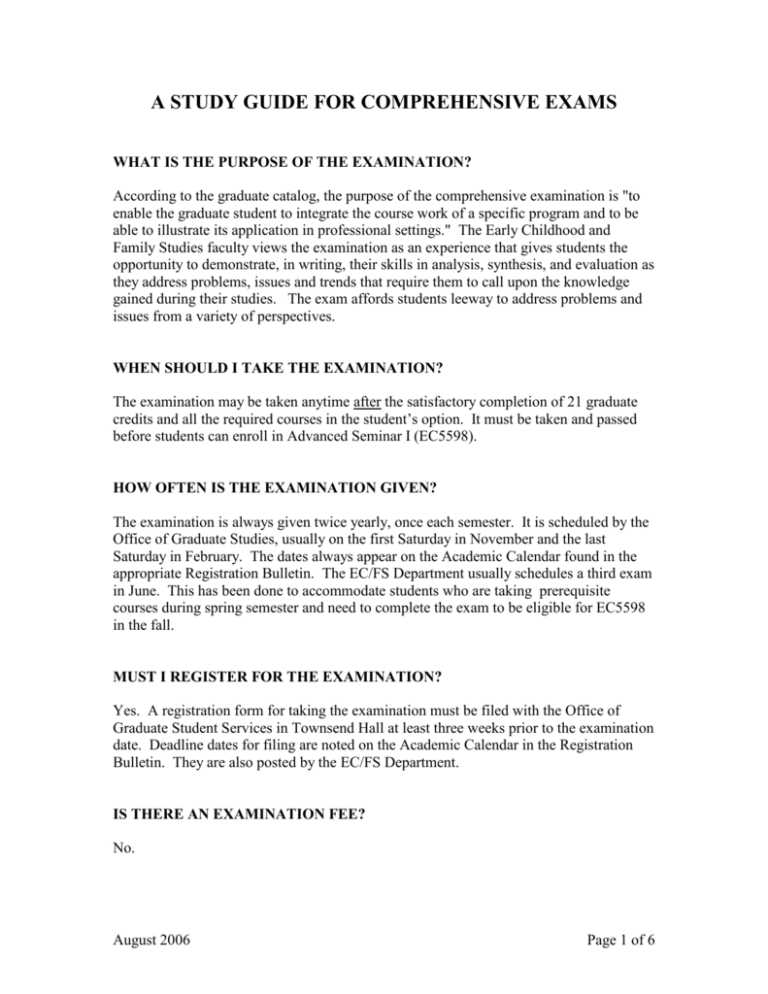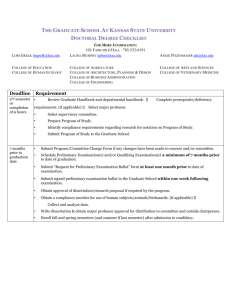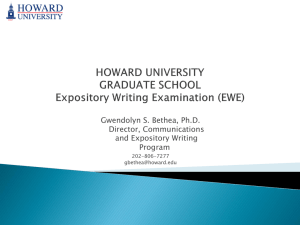A STUDY GUIDE FOR COMPREHENSIVE EXAMS
advertisement

A STUDY GUIDE FOR COMPREHENSIVE EXAMS WHAT IS THE PURPOSE OF THE EXAMINATION? According to the graduate catalog, the purpose of the comprehensive examination is "to enable the graduate student to integrate the course work of a specific program and to be able to illustrate its application in professional settings." The Early Childhood and Family Studies faculty views the examination as an experience that gives students the opportunity to demonstrate, in writing, their skills in analysis, synthesis, and evaluation as they address problems, issues and trends that require them to call upon the knowledge gained during their studies. The exam affords students leeway to address problems and issues from a variety of perspectives. WHEN SHOULD I TAKE THE EXAMINATION? The examination may be taken anytime after the satisfactory completion of 21 graduate credits and all the required courses in the student’s option. It must be taken and passed before students can enroll in Advanced Seminar I (EC5598). HOW OFTEN IS THE EXAMINATION GIVEN? The examination is always given twice yearly, once each semester. It is scheduled by the Office of Graduate Studies, usually on the first Saturday in November and the last Saturday in February. The dates always appear on the Academic Calendar found in the appropriate Registration Bulletin. The EC/FS Department usually schedules a third exam in June. This has been done to accommodate students who are taking prerequisite courses during spring semester and need to complete the exam to be eligible for EC5598 in the fall. MUST I REGISTER FOR THE EXAMINATION? Yes. A registration form for taking the examination must be filed with the Office of Graduate Student Services in Townsend Hall at least three weeks prior to the examination date. Deadline dates for filing are noted on the Academic Calendar in the Registration Bulletin. They are also posted by the EC/FS Department. IS THERE AN EXAMINATION FEE? No. August 2006 Page 1 of 6 HOW LONG DOES THE EXAMINATION LAST? It begins promptly at 9:00 a.m. and concludes at 1:00 p.m. At the request of students the exam time was extended by one hour when the use of computers was initiated a few years ago. Students are free to leave whenever they have completed the examination. WHAT IS THE FORMAT OF THE EXAMINATION? Currently, the examination consists of one question. (Sometimes two questions are presented and students can choose which one to answer.) Students are asked to answer the question in a manner that demonstrates their mastery of the material covered by their chosen MA Option (Administration, Advanced Curriculum, or Classroom Instruction (P3)). The question has several parts, all of which must be answered completely. Responses to the question are to be presented in coherent essay form. Computers are used, and exams are saved on disc in addition to being printed out. WHO PREPARES THE EXAMINATION? The examinations are prepared by the graduate coordinator, in consultation with the EC/FS Department Graduate Committee, comprised of faculty who teach courses in the graduate program. WHO MARKS THE EXAMINATIONS? All examinations are read by three department faculty members who teach courses in the graduate program. WHAT ARE THE EVALUATION CRITERIA? Organization and coherence of response with all parts of the question addressed Writing mechanics - grammar and spelling Application of theory and research Reflection l5 points l5 points 35 points 35 points Organization The answer should follow a logical sequence, be specific and coherent, and remain focused on the question asked. All parts of the question must be answered. Writing Mechanics The answer will be examined for accuracy in usage, spelling and grammar. The writer should check to see if the intended meaning is clear, sentences are complete, punctuation is correct, references are clear, nouns and verbs agree, etc. August 2006 Page 2 of 6 Application of the literature The answer must reflect the writer's thorough knowledge and understanding of the content of the current literature. All parts of each answer must contain clear, specific, appropriate, and accurate documentation, drawn from the writer's knowledge of research, theory, and current practice. Reflection The answer should demonstrate students’ mastery of higher order thinking skills; and ability to reflect on their own learning. There should be evidence of insight derived from in-depth analysis, synthesis, and evaluation of complex ideas. WHAT GRADES ARE GIVEN? Examinations are graded as follows: Pass with commendation: 90-100 points - To receive this score, a student must write a truly outstanding answer on the chosen question, satisfying each of the criteria at a very high level. Pass: 80 - 89 points- satisfying each of the evaluative criteria at an acceptable level. Pass with condition: 70 - 79 - Students who receive this usually "fall short" on one or more of the evaluative criteria, so that the examination readers are not fully satisfied that the question has been addressed as well as it should be. When this occurs the student must meet with the graduate coordinator, who will point out the area(s) of concern and devise a strategy for removing the condition. Students who receive this grade may not register for Advanced Seminar until the condition is removed. Fail: 69 points or lower - A "fail" is given when a student's responses are judged inadequate or insufficient on any combination of evaluation criteria. WHAT HAPPENS IF I FAIL THE EXAM? Students who fail the test are permitted to take it a second time, usually at the next regularly scheduled examination period. If they fail a second time the exam may be taken again ONLY with special permission of the graduate coordinator and the Dean of the College of Education. HOW SOON WILL I KNOW MY TEST RESULTS? August 2006 Page 3 of 6 Examinations are read as soon as possible after the examination date. Obviously how quickly they can be read depends upon a number of factors, but students should expect to receive their results within four (4) weeks. Notification will be by correspondence from the Office of Graduate Student Services. WHO RECEIVES THE TEST RESULTS BESIDES ME? Exams are identified only by assigned code numbers, so that readers do not know whose comp they are evaluating. Results are recorded by the graduate coordinator, using code numbers only and are forwarded to the Office of Graduate Student Services where code numbers are matched with students’ names. That office notifies students of the result by letter and sends the EC/FS graduate coordinator a results list with students’ names included. In summary, the only persons who receive the test results are the student, the graduate office advisor, and the graduate coordinator, who then shares the composite results with the Graduate Committee. WHAT SHALL I BRING WITH ME TO THE EXAMINATION ROOM? You need not bring anything with you, and indeed should not bring anything except possibly a writing instrument. Sometimes students are asked to bring a summary of their course analysis forms with them. If that is the case, students who have registered for the exam will be notified beforehand by a letter with special instructions. Computers, pencils, scratch paper, and CD’s are provided. Having a watch can be helpful. WHERE WILL BE THE EXAMINATION BE GIVEN? A few days prior to the examination you should receive a letter from the Office of Graduate Studies advising you where to report (usually to a computer lab in Hennings Hall or CAS). The proctor/computer technician who has been assigned to your room will arrive between 8:00 and 8:30 a.m. to sign students in, distribute exams, give instructions, etc. The proctor will remain with you throughout the morning. HOW SHOULD I PREPARE FOR THE EXAMINATION? Students have used a number of strategies to get themselves ready. Suggestions they have made include: l. Reviewing course notes and assignments prepared for all courses. 2. Completing a Course Analysis Chart for each course taken. The Course Analysis Chart Template and Example are attached. Microsoft work versions of the template are available from the graduate coordinator on request. August 2006 Page 4 of 6 3. Forming study teams with other students in the program and reviewing together. 4. Writing test questions from your reviews and preparing outlines of answers to those questions. 5. Keeping up to date with the current literature by reading journals such as Young Children or The Early Childhood Research Quarterly. IS THERE A RECOMMENDED READING LIST? No. The objective is to "put to work" the knowledge gained while in the program - not to do additional reading for the “sake of the exam.” Obviously students are encouraged to draw on all sources of knowledge available to them, but this is not meant to suggest they should suddenly undertake a program of new readings hoping to "hit upon" something they might use for the examination. HOW CAN I PREPARE AN EXAMINATION THAT MERITS COMMENDATION? The answer to this depends a lot upon what you're comfortable doing, but for many students some of the following suggestions have proven helpful. l. Read all of the questions carefully, then select the one you feel you are best prepared to answer.. 2. Read the question again, making certain you know what the problem is and what's being asked of you. 3. On scratch paper outline points you want to be certain to make and note the names of relevant authorities and their contribution. 4. Formulate a "writing plan" in your mind or on scratch paper making certain it addresses all parts of what is being asked. 5. Write - referring back to your notes occasionally to make certain you're addressing everything you intended to and that what you're writing "fits" the questions asked. 6. Keep track of the time - making certain you're allowing yourself enough time to answer all parts of the question (following steps 2-5) and to reread your responses, making minor changes or comments. August 2006 Page 5 of 6 7. Keep your cool! Don't panic! You have four hours; use it wisely and well. If you "block" give yourself a couple of minutes break and refer back to your outline as a resource. ARE THERE "OLD" EXAMINATION QUESTIONS I CAN SEE FOR PRACTICE? No. The best preparation is to carefully complete the Course Analysis Charts, go over them, and review your own learning during the graduate program. WHAT OTHER ASSISTANCE IS AVAILABLE? Sometimes students organize a review group In the event that such a group is formed, the graduate coordinator is available, upon request, to meet with to help organize and get the process started Updated 8/06 by M. Kelly August 2006 Page 6 of 6





